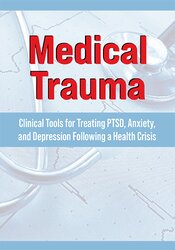
×

Tags: APA
Your clients with medical trauma know that a health crisis can upend life at any moment.
And they know that crisis doesn’t end when the physical body is stabilized.
The impacts of medical trauma are as broad as they are misunderstood. Many mental health problems can arise from experiences like heart attack, stroke, intubation and mechanical ventilation, emergency Caesarean section, allergic reaction, seizure, accident-related amputation, cancer diagnosis, and more.
While some clients may have entered your practice with the unique presentation of PTSD that results from medical trauma, many more have likely come to you for help with other clinical issues that could be fueled by a past health crisis. Think of the client with depression who also has a history of heart failure. Or the client with social anxiety whose irritable bowel disease is listed on your intake form but never gets discussed. Or the client with dependency issues in their relationships who harbors a deeply entrenched sense of fragility related to a congenital illness.
Join medical trauma expert Dr. Sacha McBain for this one-day training that will help you understand the interconnectedness of the mind and body. You will learn to:
Your clients with medical trauma have associated treatment with danger. Register today to provide them with a trauma-informed approach to promote physical and psychological recovery!
All members of the PESI, Inc. planning committee have provided disclosures of financial relationships with ineligible organizations and any relevant non-financial relationships prior to planning content for this activity. None of the committee members had relevant financial relationships with ineligible companies or other potentially biasing relationships to disclose to learners. For speaker disclosures, please see the faculty biography.
Continuing education credit information is coming soon for this live webcast.

Sacha McBain, PhD, is a clinical psychologist and assistant professor at the University of Arkansas for Medical Sciences (UAMS) in Little Rock, AR, where she serves as the associate director of the Center for Trauma Prevention, Recovery and Innovation and leads the Trauma Psychology Consult Service. Dr. McBain provides training and consultation to medical services regarding implementation of trauma-informed care practices and health care worker wellness initiatives designed to prevent posttraumatic stress disorder. She has trained in community health and prevention research and implementation science in order to identify and put into place organizational practices within healthcare systems designed to increase access to mental health care following a traumatic event. She serves as an expert panel member on the American College of Surgeons Mental Health and Substance Use Disorder Best Practice Guidelines Work Group and is an active member of the International Society for Traumatic Stress Studies.
Speaker Disclosures:
|
Medical Trauma: Clinical Tools for Treating PTSD, Anxiety, and Depression Following a Health Crisis
Fri, Jan 24, 2025 - 09:00am to 05:00pm EST - Product Code LWC058772 |
|
Medical Trauma: Clinical Tools for Treating PTSD, Anxiety, and Depression Following a Health Crisis
Fri, Feb 21, 2025 - 11:00am to 07:00pm EST - Product Code LWC058772 |
|
Medical Trauma: Clinical Tools for Treating PTSD, Anxiety, and Depression Following a Health Crisis
Wed, Mar 26, 2025 - 09:00am to 05:00pm EDT - Product Code LWC058772 |
For live CE credit, you must watch the live webcast in its entirety at its scheduled time and complete the CE quiz and evaluation within one week. You will have access for 90 days after the program for review.
Please note: There will be a 70-minute lunch and two 15-minute breaks; one in the morning and one in the afternoon. Lunch and break times will be announced by the speaker and at their discretion. A more detailed schedule is available upon request.
Visit our FAQ page at https://www.pesicanada.ca/faq or contact us at https://www.pesicanada.ca/contact-us.
Satisfaction Guarantee
Your satisfaction is our goal and our guarantee. Concerns should be addressed to info@pesicanada.com.
Please wait ...